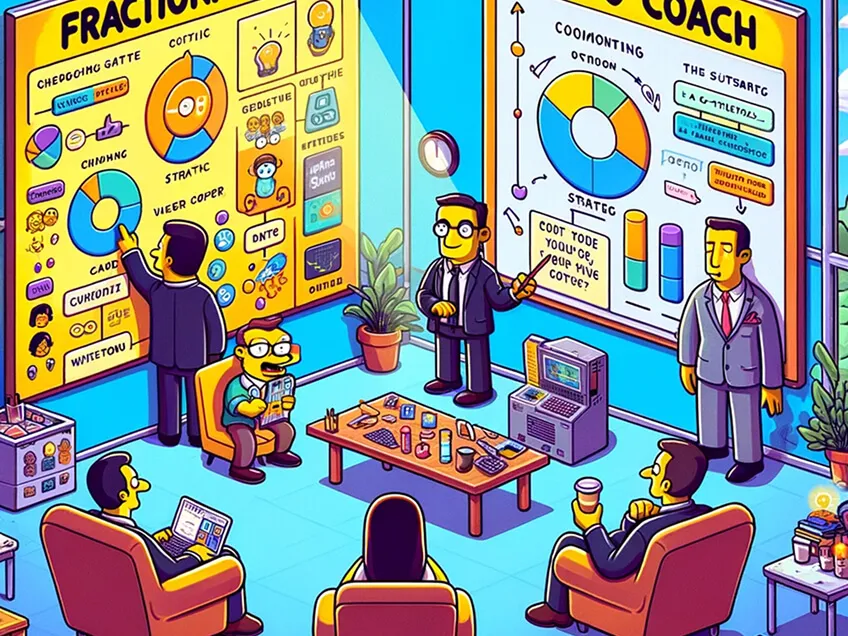
Apples and Oranges
Comparing a fractional CTO with a CTO coach might initially sound like a mismatch, but my recent experience has shed new light on this. During a welcome call for a CTO coaching session, it was the company's CEO who showed up, not the CTO. The CEO and I had a productive conversation, but it struck me as odd that the CTO, who was crucial to the process, was absent. When I inquired, the CEO explained that the CTO couldn’t make it due to time constraints. This incident made me ponder: perhaps in such scenarios, what the company really needs is not just coaching for the CTO but a fractional CTO to shoulder some of the load. This realization underscores the importance of understanding the distinct yet complementary roles these two positions can play, especially in environments where tech leadership is juggling operational demands and personal development.
The Role of a Fractional CTO
A fractional CTO is a strategic partner who steps in to complement the in-house CTO, particularly in scenarios where the latter is deeply involved in R&D and code delivery.
Expanded Key Areas Addressed by a Fractional CTO:
- Defining Onboarding Processes: They develop comprehensive onboarding strategies to ensure new hires seamlessly integrate into the team, setting them up for success from day one.
- Career and Development Discussions: By conducting focused 1-on-1s, the fractional CTO helps team members map out their career paths and personal development goals, fostering a culture of growth.
- Solving Team Conflicts: Their objective perspective is crucial in resolving conflicts, promoting a harmonious and collaborative team environment.
- Strategic Planning and Vision: They bring seasoned insights into long-term technology strategy, aligning tech initiatives with broader business goals.
- Technology Assessments and Recommendations: The fractional CTO evaluates current technologies and recommends upgrades or new technologies to keep the company competitive and innovative.
- Vendor and Stakeholder Management: They adeptly manage external relationships, ensuring collaborations align with the tech strategy.
- Budget Management and Resource Allocation: Overseeing the tech budget, they ensure resources are optimally allocated for project success.
- Risk Management and Compliance: Identifying potential risks and ensuring compliance with industry standards is a critical part of their role.
A key trait of an effective fractional CTO is a minimal ego. They should be willing to work under any title and collaborate closely with the in-house CTO, with the primary aim of enhancing the latter’s success and the overall tech strategy.
The Focus of a CTO Coach
While a fractional CTO addresses strategic and operational needs, a CTO coach is more akin to a personal mentor, focusing on individual leadership development.
Expanded Benefits of Hiring a CTO Coach:
- Leadership Skill Enhancement: They work on refining the CTO’s leadership qualities, focusing on both the technical and interpersonal aspects of leading a tech team.
- Navigating Growth Challenges: As the team and company grow, the CTO coach provides valuable insights into managing expanding responsibilities and evolving team dynamics.
- Improving Team Dynamics and Culture: They offer strategies to enhance collaboration and foster a positive work culture within the tech team.
- Personalized Feedback and Guidance: Offering tailored advice, the coach helps the CTO refine their management style and strategic approach.
- Strategic Thinking and Innovation: The coach encourages innovative thinking and helps in developing a strategic mindset, crucial for tech leadership.
- Work-Life Balance: They provide guidance on maintaining a healthy balance, crucial for long-term productivity and personal well-being.
- Navigating Organizational Politics: Coaching on managing complex dynamics within the organization, an often-overlooked aspect of tech leadership.
- Handling High-Pressure Situations: Developing skills to make effective decisions under pressure and manage stressful scenarios.
- Communication Skills: Enhancing the ability to articulate technical concepts to a non-technical audience, bridging the communication gap.
Conclusion
In conclusion, it’s crucial to remember that a good fractional CTO won’t be concerned about titles. Their focus is on customer success, not their own ego. Whether they're called a fractional CTO, an interim CTO, or any other title, what truly matters is their ability to effectively support the in-house CTO and contribute to the company's goals. In the end, it's about choosing the right support for your tech leadership to ensure the success and growth of both the team and the company.Whether your organization needs the strategic and operational input of a fractional CTO or the personal development and mentorship provided by a CTO coach depends on the specific challenges and objectives. Understanding these roles' unique contributions is key to determining the right support structure for your tech leadership and ensuring the success and growth of your team and company.

